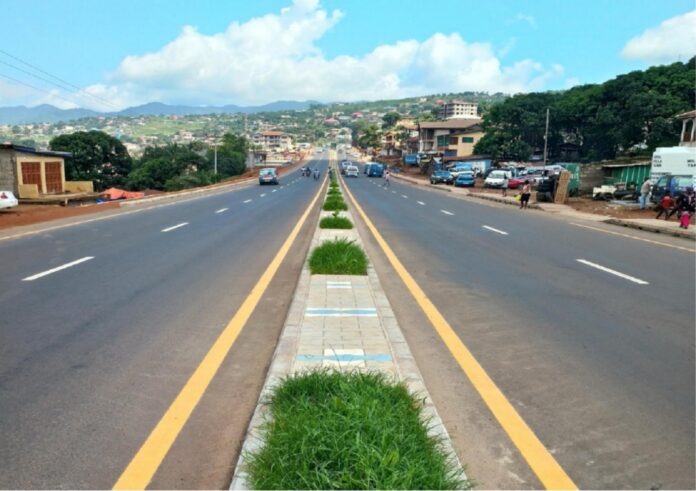By Lawrence Williams
The recent position taken by the Government of Sierra Leone regarding increment to toll tariffs for the Wellington-Masiaka Road have raised significant concerns about transparency of the agreement on the one hand, and the public interest on the other. The agreement between the Government of Sierra Leone and the China Railway Seventh Group (CRSG) was created to benefit the citizens of Sierra Leone, and it is crucial that the terms of the agreement are adhered to for the public good.
Background
In 2015 the Government of Sierra Leone entered into a Concession Agreement with the China Railway Seventh Group (CRSG) for the finance, design, construction, operation and maintenance of the Wellington-Masiaka Road for a concession period of 25yrs. The concession period was however later extended to 27yrs. The contract provides for the rehabilitation and widening of the existing two-lane road to four-lane; construction of the Orugu bridge, etc. under a build, operate and transfer (BOT) arrangement. The construction period for the complete overlay of the highway and its associated facilities, according to the agreement, should last not more than four years from the effective date, excluding events of force majeure.
Tolling System
The contract establishes a tolling system to be operated by CRSG. Clause 9.1.3 allows the tolling systems to come into force “after widening of the existing road to four lane from 0 to 10 kilometres, and after attaining 30% of site clearing works on the entire road…”
Clause 10.1 of the said agreement accords CRSG an exclusive right to collect the toll tariffs specified in Clause 10.3 from vehicles utilising the highway. However, there are provisions which allow for the adjustment of toll tariffs based on the traffic data during times of exchange rate fluctuations.
In particular, Clause 10.4 states: The toll tariff shall be adjusted subject to a review on the base traffic data by both parties whenever the exchange rate varies by 10%”
From the above provision, we learn that though exchange rate variations may trigger a review of the toll, the base traffic data is the primary determinant and must be thoroughly examined before any changes can be made.
The means that any adjustments made to toll tariffs without the provision of the base traffic data is void ab initio. Any increment to the toll tariffs should be based on reliable and verifiable data, which must be provided as per the terms of the agreement. Without the provision of base traffic data, it becomes challenging to justify any changes to toll tariffs. Therefore, it is imperative that toll tariffs are not increased without the submission of the base traffic data, in order to ensure transparency and accountability in this aspect of the contract.
Transparency & Accountability
The contract assumes that CRSG would have secure a loan for the implementation of the construction works agreement. That’s why Clause 2.5.1 expressly provides that: The GOSL shall, during the repayment of the loan and interest by the Concessionee to their lenders, receive from the Concessionee [CRSG] 5% of the gross incoming toll revenue annually and the remaining 95% shall be used for the purpose of loan and interest repayment. After the completion of the loan and interest repayment, the Concessionee shall pay to the Concessionaire [GOSL] on a yearly basis 10% of the gross incoming toll revenue and Concessionee shall be entitled to the remaining 90%.”
Whereas the above clause explains in no ambiguous terms how the toll revenue should be shared between GOSL and CRSG, the succeeding paragraph, Clause 2.5.2, provides that the revenue collected during the construction period shall be used for the complete overlay of the highway.
The above provision, one could argue, casts serious doubt on the assumption that CRSG may have contracted a loan for the construction of the road, hence the reason why the drafters of the agreement carefully inserted certain mandatory provisions under Clause 16 of the said Concession Agreement that obliged CRSG to submit its audited financial statements on a quarterly and annual basis in order for the Concessionaire not only to ascertain CRSG’s compliance with the terms and conditions of the contract including the company’s financial obligations to its lenders/creditors but also to ensure that the principles of transparency and accountability when dealing with contracts of this nature are upheld during the entire Concession period. And it’s for this reason that Clause 16.1 grants GOSL the liberty to issue a written approval for an internationally recognised accounting firm to conduct the business of auditing on the accounts of CRSG.
It must be emphasised that the submission of audited financial reports by CRSG, as required by the agreement, is crucial for maintaining transparency and accountability. These reports offer insights into the financial health and performance of CRSG, allowing for an assessment of whether the terms of the agreement are being met and whether the contract is being implemented in the best interests of the public. Enforcing compliance with the submission of audited financial reports is essential for oversight and ensuring that CRSG remains accountable and transparent in its operations.
Contract Review
The Concession Agreement, as stipulated in Clause 22.15, should be reviewed every three years from the effective date. This review process is necessary for assessing the performance of the overall agreement and provides an opportunity to address any emerging issues to ensure that the GOSL/CRSG partnership continues to serve the best interest of the Sierra Leonean public. Regular reviews are essential for evaluating the effectiveness and impact of the contract, allowing for necessary adjustments to be made in accordance with the public interest and the original objectives of the agreement.
In conclusion, the Government of Sierra Leone must prioritise transparency, accountability, and adherence to the terms of the agreement with CRSG. This includes linking toll tariff adjustments to the provision of base traffic data, enforcing the submission of audited financial reports, and conducting regular reviews of the entire agreement. By doing so, the government can ensure that the partnership with CRSG serves the best interests of the citizens of Sierra Leone and upholds the principles of transparency and accountability.




